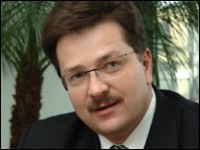Russian decision to suspend European arms control treaty scares Moldova

Moldova’s foreign minister said Friday that Russia 's pulling out of a key European arms control treaty could make Moldovan efforts to have some 1,500 Russian troops withdrawn from its territory fruitless.
Foreign Minister Andrei Stratan said Moldova would voice its concerns at a summit the Organization for Security and Cooperation in Europe, being held later this year in Madrid.
"The Republic of Moldova has asked for and will continue to ask for the pullout of Russian troops" stationed in the breakaway region of Trans-Dniester, which Moscow supports, Stratan said
Moldova fears, however, that it will lose leverage in the argument if Russia withdraws from the Conventional Forces in Europe Treaty.
Russia's lower house of parliament voted unanimously Wednesday to suspend Moscow's participation in the treaty, approving President Vladimir Putin's initiative in a widely expected show of defiance to the West. The legislation must now be approved by the Russian upper house and signed by Putin before going into effect, expected by Dec. 12.
The treaty is one of several issues straining Russia's relations with the U.S. and Europe.
An original 1990 pact set limits on the deployment of conventional armaments by NATO and Warsaw Pact countries. But the disintegration of communism and the 1991 collapse of the Soviet Union changed strategic balances, and a revised treaty was worked out in 1999.
Russia ratified the updated treaty in 2004, but the United States and other NATO members have refused to do so, demanding that Moscow fulfill obligations it made in 1999 to withdraw its forces from Georgia and Moldova's Trans-Dniester.
Trans-Dniester, a small pro-Russian enclave in eastern Moldova, declared independence in 1991 and fought a war with Moldova in 1992 that left more than 1,000 people dead. Trans-Dniester is not recognized internationally, but receives support from Russia, which keeps at least 1,500 troops there to act as peacekeepers and to guard large weapons storage facilities left over from the former Soviet military.
Subscribe to Pravda.Ru Telegram channel, Facebook, RSS!


